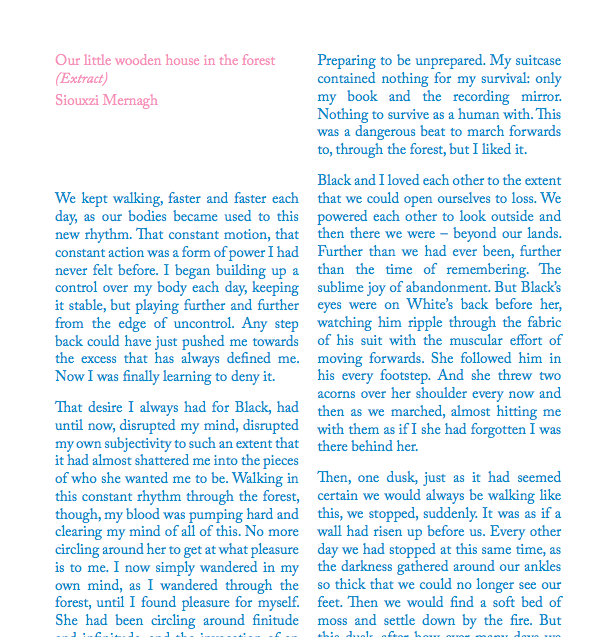
Siouxzi Mernagh, Little houses, big forests (desire is no light thing), Repeater Books, 2017.
siouxzimernagh.com/
Little houses, big forests (desire is no light thing) is an anthology of essays, short fiction, novel extracts and film stills – the first containment in one place of the writing and visual work of Siouxzi Mernagh. The book is an invitation to get lost within varied landscapes of its pages: middle-of-nowhere Australia, the minds of Susan Sontag and W.G Sebald, and, most prominently, the proverbial forests of all of our childhoods. There are, however, a few thematic paths to trace through these landscapes. Coming-of-age desire, our uneasy sense of self when isolated in nature and female sexuality become the mile-markers. The invitation to get lost is an invitation to come out the other side with the sense that being lost is not necessarily a state to be avoided but one in which we can occasionally luxuriate in.

Our Little Wooden House in the Forest (previous working title: ‘In the dark, dark room’) is an ambitious cross-media experiment involving academic research methods in affiliation with the ICI; a performative installation; preparation for an experimental narrative film; and preparation for a resulting novel. Each of these works hinges on the exploration of the proverbial space of a cabin in a forest. The project, an intersection between art and scholarship, marks a significant amalgamation of Siouxzi’s key thematic and stylistic concerns since the beginning of her practice. It is at once a dynamic shift from her work created within the ICI Berlin’s core project on tension in addition to being in close alignment with the Institute’s current focus – ‘Wholes Which Are Not One’. The three characters within the project, Red, Black and White, are indeed representations of both parts and wholes of a conceptual narrative space: they exist, simultaneously as defined parts and as a collective whole within the cabin in the forest, resistant to traditional notions of binary oppositions. Their existences are at once reliant on each other for survival and the very thing that threatens each of their individual existences.
short extract:
“We go out into the forest sometimes to chop wood, taking it in equal turns.These wood-chopping trips are the only time we ever leave our little house. When it’s my turn, I talk to the snow. I talk to it as it drifts and ask if it’s drifting into sleep or out of it. My feet disturb it, rustle it; the friction between my inside world and its outside world make heat that melts it and chills me. The sound is a kind of sex. The branches of the trees are letting the promiscuous snow rest there, rest there in their bare curves. The snow sleeps there, so open, collapsed into utter trust. One body giving the other comfort at the expense of its own. I keep the rhythm of my feet in the snow in time with the rhythm of my breathing. Any slower and I freeze, any faster and I tire out too soon, and then I freeze. The two must stay in synch. These times are the only times in winter that I am without the others. I am not alone here, because of the voices of the trees in the winter wind, and the strongest birds that have stayed on and not abandoned the forest. We are still here, together, I am not alone here. And the siren-swamp is still here, her scent and her colours dulled by the brilliant smothering of snow, but she is still here. I am not alone. And on the days when I can trust the sun will stay and not trick me into wandering in darkness, I detour from collecting wood and visit her, this siren-swamp.”
novel extract: ‘Your bones ache with its aches.’
Short fiction: Leda in Glass
Siouxzi L Mernagh is currently working on a new novel, ‘In the dark, dark room’, in affiliation with the Berlin Institute for Cultural Inquiry, and on several pieces of short fiction.
Her novel ‘The Peep Show’ has been performed and exhibited in several solo shows in Sydney and Berlin.
Her first novel, ‘White Tales’ has several extracts published with Turia & Kant (Wien/ Berlin) as part of the volume “Tension/ Spannung” created by the Berlin Institute for Cultural Inquiry.
Siouxzi also works as a freelance magazine writer for several publications .
Siouxzi L Mernagh is an Australian-born writer and artist and an affiliated fellow of the ICI Berlin Institute for Cultural Inquiry. She is a former research fellow of the ICI, having undertaken a fellowship concerning the spatial, temporal and sexual tensions within psychoanalytic films and subsequently completing an experimental narrative film titled ‘The Dangers’ as a direct response to her research. Siouxzi has since produced provocative and sensual work in writing, moving-image, installation, photography and performance in Sydney, London and throughout Europe. Extracts from her first novel, White Tales, were published by Turia & Kant (Wien/ Berlin) as part of the volume “Tension/ Spannung”. Her recently completed novel manuscript ‘Our Little Wooden House in the Forest’ (alt. working title ‘In the dark, dark room’), stems from her research with the ICI and her residency at Mustarinda, Finland. She is based in Berlin.

No comments:
Post a Comment
Note: Only a member of this blog may post a comment.